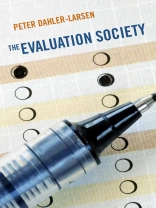Evaluation—whether called by this name, quality assurance, audit, accreditation, or others—is an important social activity. Any organization that ‘lives in public’ must now evaluate its activities, be evaluated by others, or evaluate others. What are the origins of this wave of evaluation? And, what worthwhile results emerge from it?
The Evaluation Society argues that if we want to understand many of the norms, values, and expectations that we, sometimes unknowingly, bring to evaluation, we should explore how evaluation is demanded, formatted, and shaped by two great principles of social order: organization and society. With this understanding, we can more conscientiously participate in evaluation processes; better position ourselves to understand many of the mysteries, tensions, and paradoxes in evaluation; and use evaluation in a more informed way. After exploring the sociology and organization of evaluation in this landmark work, author Peter Dahler-Larsen concludes by discussing issues that are critical for the future of evaluation—as a discipline and a societal norm.
Over de auteur
Peter Dahler-Larsen is Professor in the Department of Political Science at the University of Copenhagen. Prior to his current appointment, he built and directed the Master’s Program in Evaluation at the University of Southern Denmark. A past president of the European Evaluation Society, Dahler-Larsen is especially interested in the cultural and institutional aspects of evaluation.












